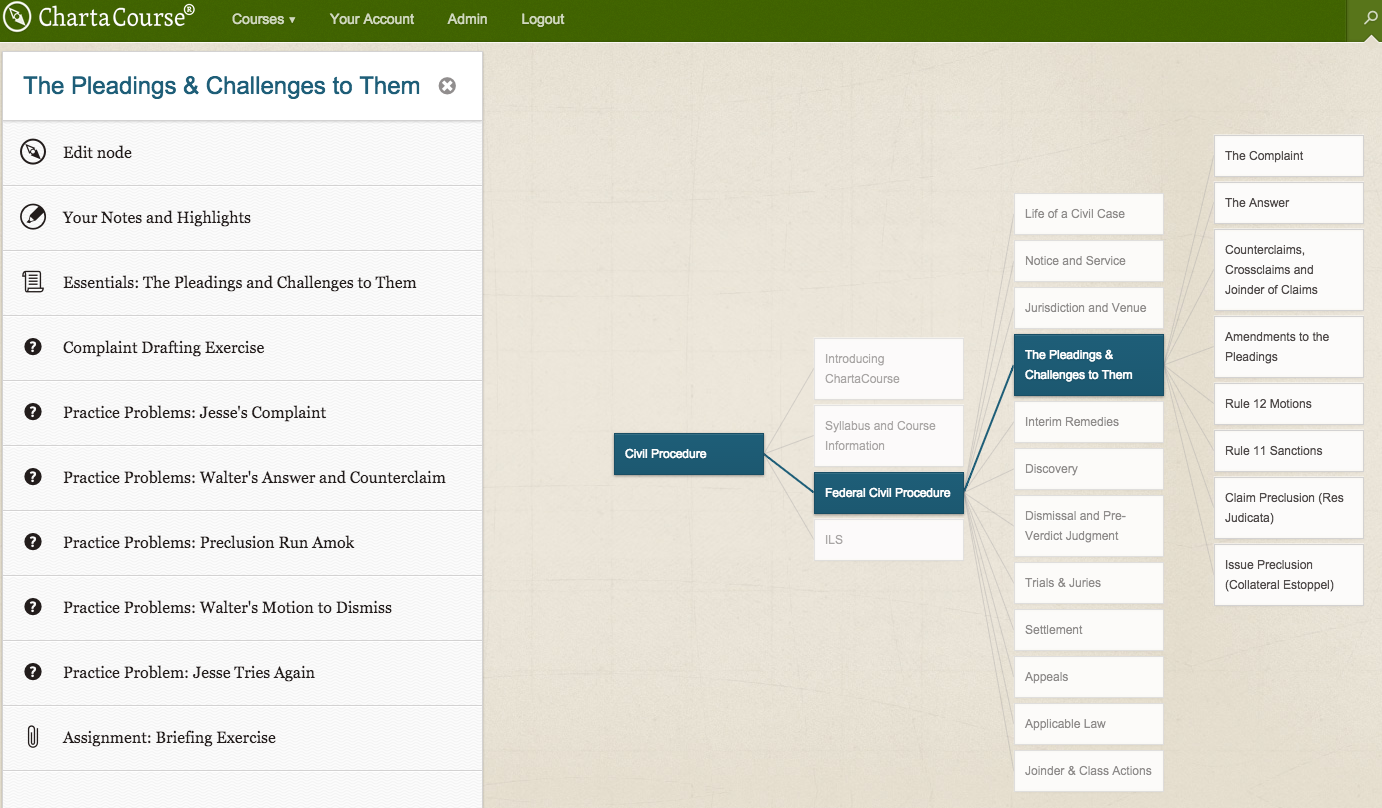In my last post, I asked whether academics committed to social justice need to practice social teaching, social learning, and social scholarship. Answering “yes” based on intuition alone, I promised to report on my own fledgling academic collaborations and reflect on their potential as part of a social justice praxis. Today I’ll discuss my initial experience using a social teaching platform called ChartaCourse.
ChartaCourse is basically an online lawschool casebook system. This system is organized around a concept-mapping principle, which is implemented using an elegant visual design. Courses are broken up into concepts and sub-concepts (and sub-sub-concepts, etc). To see what the interface looks like, take a peek at this snapshot from my Civil Procedure Chart:
Since the system is built on top of WordPress, any professor adopting the course can easily customize and add to the “base chart” provided by ChartaCourse. For anyone who has blogged before, navigating the “back end” interface is pretty easy.
I consider my experiment with ChartaCourse as one in “social teaching” for two basic reasons.
First, ChartaCourse is a start-up company and adopting its product means you play in the start-up world. This is an inherently collaborative undertaking. It’s also fun because Mark Edwards, William Mitchell prof and ChartaCourse’s CEO, is a fun guy who has assembled an excellent team. As I’ve worked with his team to iron out hiccups and to iron in new features for my own Civ Pro course, I have felt far less isolated than I normally do while prepping. Down the line, the idea is to create a community of adopters who share their individual innovations with the larger collective.
Second, ChartaCourse encourages social and interactive student learning. The visual layout allows students to dynamically navigate between idea forests and trees while mark-up features permit students to annotate course materials and take their own notes. There are practice problems and customizable “guideposts” which lead students through rule-based decision trees in a TurboTax-like fashion. The very nature of the platform encourages professors to break-up their often dense materials into manageable and interconnected chunks. Though I haven’t yet had the opportunity to use ChartaCourse in the classroom — the semester starts next week! — I have a feeling that students will relate to this kind of networked course book better than they do to the usual tomes.
So how does this connect to social justice?
Here it’s primarily about saving students money. A ChartaCourse subscription costs $49 per course — significantly less than the ordinary casebooks, which usually run students upwards of $150 per volume. Admittedly, this isn’t social justice in the full-throated radical sense. ChartaCourse isn’t throwing molotov cocktails at the Establishment. Yet even though ChartaCourse is for profit, it is far from greedy and that alone is pretty radical given the norms of the otherwise cutthroat industry.
As the graph above shows, educational book publishers have been squeezing students dry for the last couple of decades. ChartaCourse is hoping to bring a little more sanity and fairness to that market. That aspiration combined with a pedagogically sound dedication to innovation makes the ChartaCourse venture count as social-justice inspired in my book.
After a few weeks of teaching Civ Pro, I’ll report back here on my experiences. For now, I’m happy to be part of this collaborative social teaching experiment.
Next time: Social Justice and Access to Law: Open-Source, CourtListener, and SCOTUS Network Mapping.



Great post, thanks for sharing.